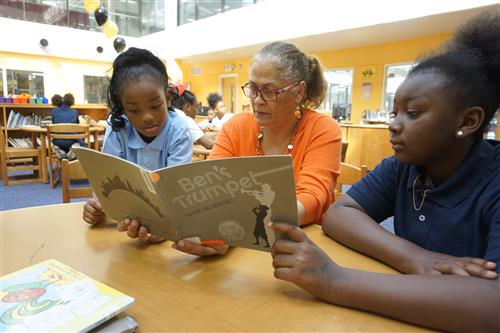Early Childhood Education, Office of
Page Navigation
- Cleveland Metropolitan School District
- Office of Early Childhood and Literacy Education
-
Office of Early Childhood and Literacy Education
Literacy arouses hopes, not only in society as a whole but also in the individual who is striving for fulfillment, happiness, and personal benefit by learning how to read and write. Literacy means far more than learning how to read and write. The aim is to transmit knowledge and promote social participation.
—UNESCO Institute for Education, Hamburg, Germany: The Search for Solid Ground Language development is the motherboard for all learning so it is crucial that all students develop strong literacy skills to be successful in the world. Literacy skills lay the foundation for education and in the Cleveland Metropolitan School District, and we are committed to providing students with learning experiences that are engaging, differentiated and joyful for all students.
Language development is the motherboard for all learning so it is crucial that all students develop strong literacy skills to be successful in the world. Literacy skills lay the foundation for education and in the Cleveland Metropolitan School District, and we are committed to providing students with learning experiences that are engaging, differentiated and joyful for all students.Evidence-based, proven instructional practices are used in all classrooms through systematic teaching that aligns to the District’s Theory of Action and Literacy Framework. Schools provide students with multi-tiered systems of support that focuses on the development of the big ideas in literacy while students are afforded several real world opportunities to express thinking, ideas and responses to text through writing and speaking through a variety of formats including digital media. Classrooms are interdisciplinary in nature and teachers facilitate active, joyful learning environments where students take pride in their contribution to the environment. Through the use of evidence-based strategies and tools, students develop into lifelong learners who read, write and think productively at high levels to happily succeed independently in their world.
-
Priorities
- Ensure that all students engage in differentiated, joyful learning that includes the facilitation of a core instructional literacy block.
- All schools facilitate a multi-tiered system of support with a focus on the big ideas in literacy for each grade.
- All classrooms will integrate literacy (reading, writing, speaking, and listening) throughout content areas and promote the use of oral and written expression throughout learning and teaching.
- Disciplinary literacy will be addressed through providing opportunities to engage students in reading and writing routines embedded into various disciplines.
Strategies
Core Instructional Literacy Block- All classrooms will use the CMSD Literacy Framework to guide instructional planning that is aligned to Ohio’s Learning Standards for English Language Arts. The literacy focus for all grades will include learning and teaching in the following areas: word knowledge, comprehension, fluency and writing.
- Administrators will use look for tools and resources provided to ensure that all classrooms are engaging in high quality, joyful, learning experiences aligned to the District Frameworks.
Multi-Tiered System of Support Focused on the Big Ideas in Literacy- All K-3 classrooms will provide ‘off track’ students (in reading) with a minimum of 90 minutes of additional strategic, systematic instruction focused on the Big Ideas in Reading weekly.
Promotion of Oral and Written Expression in All Content Areas- Students will be provided with engaging, real-world experiences that encourage them to use and apply literacy skills in a variety of contexts.
- All classrooms across content areas will provide reading and writing experiences aligned to Ohio’s Learning Standards in English Language Arts to build students’ competence in disciplinary literacy and discourse.
Reading and Writing Routines Embedded in Various Disciplines- Teachers will facilitate learning environments that include providing all students with access to high quality text resources (informational and literal) in a variety of genre and formats (including digital).
- All classrooms will focus on using the integration of writing across curriculum through weekly instruction and assignments.
- All literacy classrooms will provide instruction in proper MLA style appropriate for each grade level to support students in citing sources when answering questions in written and/or oral form.
-
KEY CONTACTS
Gloriane Smith, Early Learning and Literacy Manager, Grades PK-5Rita Duda, ELA Manager, Grades 9-12Traci Inmon, Model Lead Teacher Data Specialist PreK-3Raquel White, Model Lead Teacher Data Specialist PreK-3

